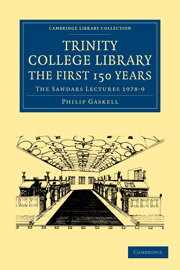Book contents
- Frontmatter
- Contents
- Lists of illustrations and plans
- Preface
- Terms and conventions
- Abbreviations
- 1546–1600
- 1 College libraries in the sixteenth century
- 2 The libraries of Michaelhouse and the King's Hall
- 3 The establishment of Trinity College Library
- 4 The need for books at Trinity in the sixteenth century
- 5 The College Library in the mid-sixteenth century
- 6 The College Library in 1600
- 7 The development of the collection up to 1600
- 8 Private libraries
- 1601–1695
- APPENDIXES
- Index
4 - The need for books at Trinity in the sixteenth century
Published online by Cambridge University Press: 05 August 2011
- Frontmatter
- Contents
- Lists of illustrations and plans
- Preface
- Terms and conventions
- Abbreviations
- 1546–1600
- 1 College libraries in the sixteenth century
- 2 The libraries of Michaelhouse and the King's Hall
- 3 The establishment of Trinity College Library
- 4 The need for books at Trinity in the sixteenth century
- 5 The College Library in the mid-sixteenth century
- 6 The College Library in 1600
- 7 The development of the collection up to 1600
- 8 Private libraries
- 1601–1695
- APPENDIXES
- Index
Summary
Trinity College was intended from the start to be large and rich. The scheme drawn up for Henry VIII in the spring of 1546, and the charters of foundation and dotation which followed in December of the same year, provided for a College of a Master and fifty Fellows with an annual income from endowments of about £1,640. By contrast Michaelhouse and the King's Hall at the time of their dissolution had between them a total of thirty-three Fellows and a combined annual income from endowments of only £400. The first, Edwardian, Statutes of Trinity which were confirmed in 1552 again provided for fifty Fellows, but in the Elizabethan Statutes of 1560, which were to remain in force for nearly three hundred years, the number was raised to sixty.
Besides the sixty Fellows of the 1560 Statutes, some of whom were to act as College Lecturers, Tutors, etc., there were to be sixty-two junior Scholars; thirteen sizars (poor students); an unspecified number of pensioners (fee-paying students); four Chaplains and a Choir; and various other functionaries and servants. All but two of the Fellows were required to study divinity, the two exceptions being allowed to study civil law and medicine respectively; and all but the two legal and medical Fellows were obliged to take holy orders within seven years of graduating MA.
- Type
- Chapter
- Information
- Trinity College Library. The First 150 YearsThe Sandars Lectures 1978–9, pp. 22 - 24Publisher: Cambridge University PressPrint publication year: 2010First published in: 1980



